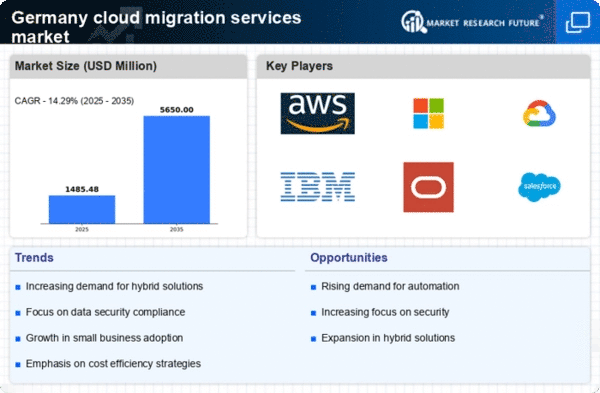Rising Demand for Scalability
The cloud migration services market in Germany experiences a notable surge in demand for scalable solutions. As businesses increasingly seek to adapt to fluctuating market conditions, the ability to scale resources up or down becomes paramount. This trend is particularly evident among small and medium-sized enterprises (SMEs) that require flexible IT infrastructures. According to recent data, approximately 70% of German SMEs express a need for scalable cloud solutions to support their growth strategies. This rising demand for scalability is likely to drive innovation within the cloud migration-services market, as providers enhance their offerings to meet these evolving needs.
Regulatory Compliance Pressures
Regulatory compliance remains a critical driver for the cloud migration-services market in Germany. With stringent data protection laws such as the General Data Protection Regulation (GDPR), organizations are compelled to ensure that their cloud solutions adhere to these regulations. This compliance pressure is particularly pronounced in sectors such as finance and healthcare, where data sensitivity is paramount. As a result, cloud migration services that offer robust compliance frameworks are increasingly sought after. It is estimated that around 60% of German companies prioritize compliance when selecting cloud service providers, underscoring the importance of regulatory adherence in shaping the cloud migration-services market.
Shift Towards Remote Work Solutions
The shift towards remote work has significantly influenced the cloud migration-services market in Germany. As organizations adapt to new work environments, the demand for cloud-based collaboration tools and services has surged. This trend is reflected in the increasing investment in cloud infrastructure, with companies allocating approximately 40% of their IT budgets to cloud solutions. The need for seamless access to data and applications from various locations drives businesses to migrate to the cloud. Consequently, cloud migration services that facilitate this transition are experiencing heightened demand, as organizations seek to enhance productivity and maintain operational continuity in a remote work landscape.
Integration of Advanced Technologies
The integration of advanced technologies such as artificial intelligence (AI) and machine learning (ML) is transforming the cloud migration-services market in Germany. These technologies enable businesses to optimize their cloud environments, enhancing performance and efficiency. For instance, AI-driven analytics can provide insights into resource utilization, allowing organizations to make informed decisions during the migration process. Furthermore, the adoption of AI and ML is projected to increase by 30% in the next few years, indicating a strong trend towards intelligent cloud solutions. This integration not only streamlines operations but also positions companies to leverage data more effectively, thereby enhancing their competitive edge.
Cost-Effectiveness of Cloud Solutions
The cost-effectiveness of cloud solutions is a pivotal driver for the cloud migration-services market in Germany. Organizations are increasingly recognizing the financial benefits associated with migrating to the cloud, including reduced capital expenditures and operational costs. A recent survey indicates that nearly 75% of German businesses report significant savings after migrating to cloud services. This trend is likely to continue as companies seek to optimize their IT spending. Furthermore, the competitive pricing strategies adopted by cloud service providers are making cloud migration more accessible to a broader range of businesses, thereby fueling growth in the cloud migration-services market.
















